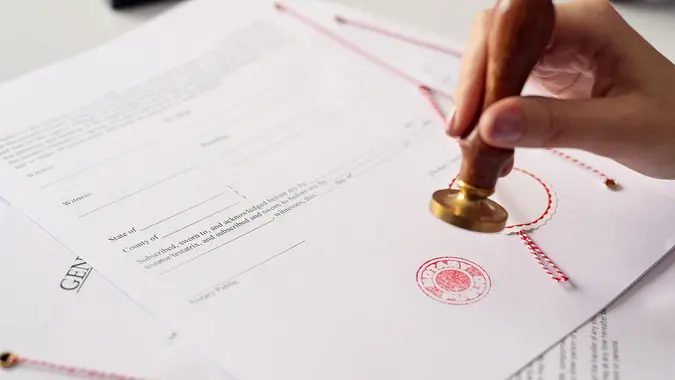I Make $5,000 Monthly Via My Side Gig — Here’s How Many Hours I Have To Work

Commitment to Our Readers
GOBankingRates' editorial team is committed to bringing you unbiased reviews and information. We use data-driven methodologies to evaluate financial products and services - our reviews and ratings are not influenced by advertisers. You can read more about our editorial guidelines and our products and services review methodology.

20 Years
Helping You Live Richer

Reviewed
by Experts

Trusted by
Millions of Readers
Side gigs can be a fantastic way to earn some extra cash on your own terms, whether you’re looking to pay off debt, save up for a big purchase, or just have a bit more financial freedom. But how much can these side hustles really make, and how much time do they require?
TJ Kimsey’s side gig, Cheerdocious, was initially inspired by her daughter’s cheerleading career. She started by making doll outfits that matched cheer uniforms, cheer shoe covers and team spirit bears that matched All-Star teams. Although her daughter no longer cheers, Kimsey has maintained her online shop and has expanded her offerings.
“I have added to my online shop to include crafts from other small, women-owned businesses to support other moms trying to cover the extras,” she said.
Let’s dig a little deeper into how many working hours you’ll need to commit to your side gigs.
Earnings and Time Commitment
Kimsey’s income from Cheerdocious varies, ranging from $1,000 to $5,000 monthly. The income may not be a lot, but Kimsey views it as fun and rewarding, and the additional income helps with costs that fall outside her family’s regular budget.
“I spend about four hours a week off-season and 15 to 20 during peaks like the height of cheerleading and Christmas, which sometimes collide,” she said. “It’s not much, but it’s a fun side gig, and still serves the purpose of covering extras.”
Even though the time and effort required can be considerable during busy times of the year, Kimsey finds the side gig a valuable supplement to her income.
Find Your Niche
If you’re interested in starting a craft-based side gig, identify products you genuinely enjoy making that people will also buy. You’ll also need to experiment and pivot as you learn what sells and what you genuinely find fulfilling to create.
Kimsey has learned that the key to success in the craft-based side hustle world is finding items that can be produced quickly yet are still appealing to buyers.
“Crafting itself is a tough gig because the amount of time that goes into some of these finished projects is often undervalued,” said Kimsey. “If you love to craft and want to make a business of it, the best thing is to find the items that can be made quickly yet are well-liked by others.”
For Kimsey, these items are cheer shoe covers and customized t-shirts. These can be made quickly, and the supplies are easy to source. This lets her keep these popular items in stock at competitive prices.
“That is also why I buy from other crafters,” said Kimsey. “I know there are items that I can’t make quickly (or don’t enjoy making) but others have the supplies and knowledge to do so. For example, decorated mugs, candles, and bath bombs.”
By partnering with other small businesses, she can expand her product offerings and better serve her customers.
Don’t Price Yourself Too Low
Kimsey has learned an important lesson when pricing her handcrafted products — don’t undervalue your work. This is often where many crafters who want to turn it into a business fall short.
“It’s really easy to forget or discount the time you put into the items, that’s where many crafters fail,” she said. “True connoisseurs of quality hand-crafted products recognize quality and will pay for it.”
Kimsey believes that the customers who truly appreciate your work will be willing to pay prices that reflect the care you’ve put into it. You can earn a reasonable profit margin while still offering your customers products they love.
Find a Balance
Kimsey’s been able to build a thriving craft-based side gig, by finding her niche and focusing on products that strike the right chord. This requires finding the right balance between the products she loves to make and those that will sell well. This has been the main thing that keeps her side business rewarding and sustainable. Still, she knows that Cheerdocious probably won’t ever become her primary source of income.
“I know I won’t be quitting my day job,” she said. “Crafting as a side gig lets me be creative in a different way than my work and the income is a bonus. Maybe, if I ever retire from ‘work,’ this will supplement my retirement income.”
 Written by
Written by  Edited by
Edited by 

























